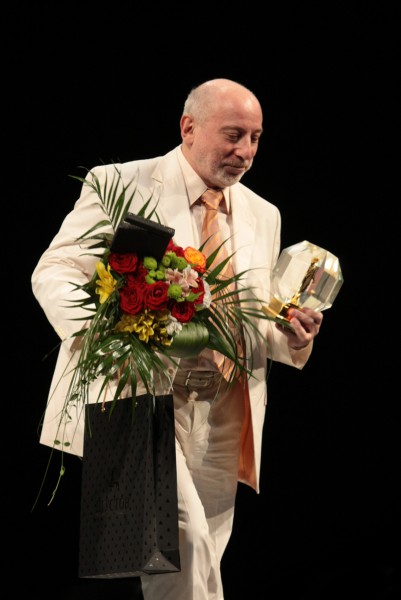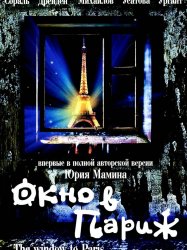Yuri Mamin is a Actor, Director, Writer, Assistant Director and Sound Russe born on 8 may 1946

Yuri Mamin (Russian: Юрий Борисович Мамин; born 8May 1946) is a celebrated Soviet and Russian film director, stage director, screenwriter, composer, author and television host, Honored Art Worker of the Russian Federation. His highly popular film "Window to Paris" (1993) may be truly called a people's film. His Buddhist-themed film "Don't Think About White Monkeys" (2008) is popular among the Russian noncomformist youth, including punks and rockers.
Yuri Mamin is the only person in Russia to have won the Chaplin's Golden Cane award. The award was presented by Charlie Chaplin's widow, Oona Chaplin, at the festival marking 100 years since the birth of the great comedian. The festival was held in the Swiss city of Vevey, where Chaplin was buried.
One special thing about Mamin's career - or, more accurately, about its almost non-existence in the totalitarian USSR, as well as in the corporate oligarchy - is the fact that he embodies in his art a vivid portrait of an inspired citizen in the fight for social justice.
Yuri Mamin began his directing career under the communist regime. He was never a communist and was always opposed to the oppressive power of the Communist Party. Because of this, he could not create his films until the beginning of Perestroika in 1985 and Mikhail Gorbachev's arrival to power.
The Gorbachev period ended in 1991 and Yuri Mamin again became a persona non grata for the criminal tycoons who almost immediately took over all the leading positions in Russian cinema and mass media.
From the early 1990s, a group of official Russian film critics, controlled by the regime, began a period of notorious denigration of the film director and his art. Against this background, Mamin's films won the love of audiences throughout the nation. Almost all of his films received numerous grand prizes and other awards.
The official state-supported Russian Encyclopedia of National Cinema, edited by L. Arkus, contains offensive critical reviews of Mamin's films, while acknowledging his talent and important place in the history of Russian cinematography.
Source : Wikidata
Yuri Mamin

Birth name Yuri Borisovich Mamin
Nationality Russie
Birth 8 may 1946 (78 years)
Awards Honored Artist of the Russian Federation
Nationality Russie
Birth 8 may 1946 (78 years)
Awards Honored Artist of the Russian Federation
Yuri Mamin is the only person in Russia to have won the Chaplin's Golden Cane award. The award was presented by Charlie Chaplin's widow, Oona Chaplin, at the festival marking 100 years since the birth of the great comedian. The festival was held in the Swiss city of Vevey, where Chaplin was buried.
One special thing about Mamin's career - or, more accurately, about its almost non-existence in the totalitarian USSR, as well as in the corporate oligarchy - is the fact that he embodies in his art a vivid portrait of an inspired citizen in the fight for social justice.
Yuri Mamin began his directing career under the communist regime. He was never a communist and was always opposed to the oppressive power of the Communist Party. Because of this, he could not create his films until the beginning of Perestroika in 1985 and Mikhail Gorbachev's arrival to power.
The Gorbachev period ended in 1991 and Yuri Mamin again became a persona non grata for the criminal tycoons who almost immediately took over all the leading positions in Russian cinema and mass media.
From the early 1990s, a group of official Russian film critics, controlled by the regime, began a period of notorious denigration of the film director and his art. Against this background, Mamin's films won the love of audiences throughout the nation. Almost all of his films received numerous grand prizes and other awards.
The official state-supported Russian Encyclopedia of National Cinema, edited by L. Arkus, contains offensive critical reviews of Mamin's films, while acknowledging his talent and important place in the history of Russian cinematography.
Usually with
Filmography of Yuri Mamin (1 films)
Actor

Window to Paris (1993)
, 1h27Directed by Yuri Mamin
Origin Russie
Genres Drama, Fantastic, Comedy, Comedy-drama, Fantasy
Actors Nina Usatova, Agnès Soral, Jean Rupert, Malka Ribowska, Yelena Drapeko, Yuri Mamin
Rating73%





Tchijov, jeune professeur de musique de Saint-Pétersbourg, découvre au font de l'armoire de la chambre qu'il vient de louer à la famille Gorokhov une fenêtre secrète qui donne sur les toits. Et ces toits sont ceux de Paris où Nicole, taxidermiste de son état, loge dans un studio dont les fenêtre donnent sur les toits.
Director

Window to Paris (1993)
, 1h27Directed by Yuri Mamin
Origin Russie
Genres Drama, Fantastic, Comedy, Comedy-drama, Fantasy
Actors Nina Usatova, Agnès Soral, Jean Rupert, Malka Ribowska, Yelena Drapeko, Yuri Mamin
Rating73%





Tchijov, jeune professeur de musique de Saint-Pétersbourg, découvre au font de l'armoire de la chambre qu'il vient de louer à la famille Gorokhov une fenêtre secrète qui donne sur les toits. Et ces toits sont ceux de Paris où Nicole, taxidermiste de son état, loge dans un studio dont les fenêtre donnent sur les toits.
Scriptwriter

Window to Paris (1993)
, 1h27Directed by Yuri Mamin
Origin Russie
Genres Drama, Fantastic, Comedy, Comedy-drama, Fantasy
Actors Nina Usatova, Agnès Soral, Jean Rupert, Malka Ribowska, Yelena Drapeko, Yuri Mamin
Roles Ecrivain
Rating73%





Tchijov, jeune professeur de musique de Saint-Pétersbourg, découvre au font de l'armoire de la chambre qu'il vient de louer à la famille Gorokhov une fenêtre secrète qui donne sur les toits. Et ces toits sont ceux de Paris où Nicole, taxidermiste de son état, loge dans un studio dont les fenêtre donnent sur les toits.
Director

Window to Paris (1993)
, 1h27Directed by Yuri Mamin
Origin Russie
Genres Drama, Fantastic, Comedy, Comedy-drama, Fantasy
Actors Nina Usatova, Agnès Soral, Jean Rupert, Malka Ribowska, Yelena Drapeko, Yuri Mamin
Roles Assistant Director
Rating73%





Tchijov, jeune professeur de musique de Saint-Pétersbourg, découvre au font de l'armoire de la chambre qu'il vient de louer à la famille Gorokhov une fenêtre secrète qui donne sur les toits. Et ces toits sont ceux de Paris où Nicole, taxidermiste de son état, loge dans un studio dont les fenêtre donnent sur les toits.

Widows (1976)
, 1h30Directed by Sergueï Mikaelian
Genres Drama, War
Actors Galina Makarova, Borislav Brondoukov, Yuriy Kayurov
Roles Assistant Director
Rating70%





Dans un village soviétique, deux veuves, Alexandra Gromova et Elisaveta Petunina, qui ont perdu pendant la Seconde Guerre mondiale tous leurs proches, vivent ensemble dans une maison. Elles entretiennent la tombe des deux soldats qu'elles ont enterrés elles-mêmes en 1941. L'identité des morts est inconnue, seul un fragment d'une photo de piètre qualité tachée de sang a été trouvé sur l'un des corps.
Sound

Window to Paris (1993)
, 1h27Directed by Yuri Mamin
Origin Russie
Genres Drama, Fantastic, Comedy, Comedy-drama, Fantasy
Actors Nina Usatova, Agnès Soral, Jean Rupert, Malka Ribowska, Yelena Drapeko, Yuri Mamin
Roles Music
Rating73%





Tchijov, jeune professeur de musique de Saint-Pétersbourg, découvre au font de l'armoire de la chambre qu'il vient de louer à la famille Gorokhov une fenêtre secrète qui donne sur les toits. Et ces toits sont ceux de Paris où Nicole, taxidermiste de son état, loge dans un studio dont les fenêtre donnent sur les toits.
 Connection
Connection


